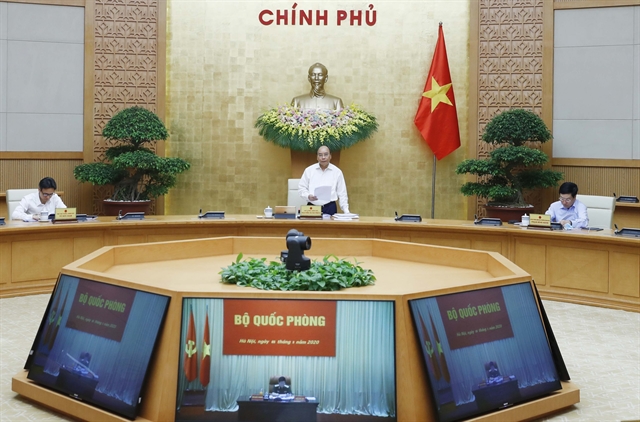[ad_1]

HÀ NỘI — Việt Nam’s GDP growth in 2020 must reach 5 per cent, higher than the 2.7 per cent the International Monetary Fund (IMF) has forecast, Prime Minister Nguyễn Xuân Phúc has said.
The rate is already the highest the IMF has predicted for any Southeast Asian country this year, with the COVID-19 pandemic wreaking economic havoc around the world and threatening to drive the global economy into recession.
“It’s very hard to reach the growth rate of the country’s initial plan (6.8 per cent) but we cannot allow the growth rate to fall too low,” PM Phúc said when he chaired a Government meeting on Tuesday in Hà Nội.
The meeting aimed to discuss a draft resolution on supporting businesses, disbursing public investment and ensuring social order during the pandemic, after the country resumed most economic activities last week following nearly a month under a nationwide social distancing directive.
Phúc said global economic growth had turned negative in the first four months of this year due to the pandemic, however, Việt Nam still recorded GDP growth of 3.8 per cent in the first quarter after the Government implemented measures to resolve difficulties for enterprises and ensure welfare policies.
PM Phúc said the country had the dual goal of effectively combating the COVID-19 pandemic while maintaining socio-economic development, as growth would create jobs, reduce poverty and ensure social security.
He ordered all relevant agencies to take prompt measures to quickly resume economic activities.
The five pillars of actions that would be critical to achieve the goal and overcome the current hardship are attracting foreign direct investment (FDI), boosting exports, stepping up public investment, attracting investment from the private sector, and promoting domestic consumption, PM Phúc said.
The Government leader also said it would be important to keep the inflation rate below 4 per cent because if inflation was too high, GDP growth would be rendered meaningless.
At the meeting, he added the country needed to disburse VNĐ700 trillion (US$29.9 billion) from the State budget for public investment projects this year and ordered all localities to work hard to implement the plan.
The Prime Minister asked the leaders of State agencies and local administrations to promptly resolve the pressing issues and complaints from people and businesses, demanding that Government officials must be working hard “for the country and the 100-million-strong population,” and not let red tape and bureaucracy get in the way of economic development.
Draft resolution
Speaking at the meeting, Minister of Planning and Investment Nguyễn Chí Dũng said the draft resolution focused on several major issues.
The issues include tax and fee exemptions or reductions; extending payment time for export tax and special consumption tax on domestically assembled and manufactured cars until the end of December; allowing special entry procedures for foreign experts, business managers and technical workers; and promoting disbursement of public investment.
The draft plans to reduce interest rates by 2 per cent for direct and indirect loans to small and medium-sized (SME) businesses supported by the SME Development Fund.
At the same time, it will allow foreign professionals, business managers, technical labourers, working in investment and business projects in Việt Nam, to apply special entry procedures to enter the country to maintain production and business activities of enterprises and comply with the regulations on prevention and control of pandemic.
The draft also schedules reducing 30 per cent of meeting and domestic travel expenses and 50 per cent of funds for business trips to foreign countries of ministries, agencies and localities this year.
Localities and relevant agencies will have to accelerate approval of dossiers of investment projects for production and business and take strict measures against individuals and organisations that cause difficulties for enterprises.
To hasten public investment disbursement, the draft proposes each locality assign an official to take responsibility for monitoring the disbursement progress in a public investment project. The progress will be used to assess the completion of the official’s task this year. — VNS
[ad_2]
Source link
